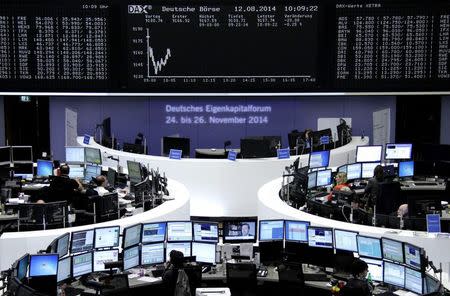Stocks, euro fall with German sentiment; oil tumbles
By Rodrigo Campos NEW YORK (Reuters) - Brent crude oil hit a 13-month low on Tuesday as ample North American production outweighed concern over supply from the Middle East, while stocks and the euro were pressured by plunging investor morale in Germany, Europe's largest economy. German shares fell more than 1 percent and the euro weakened against the U.S. dollar after the ZEW gauge of economic sentiment fell to its lowest since December 2012. German investors fretted over the impact that sanctions against Russia over its support of Ukrainian separatists could have on the German economy. Moscow said on Tuesday that a convoy of 280 trucks carrying humanitarian aid had set off for Ukraine, but Kiev said it would not allow the vehicles to cross into its territory. Ukraine and Western governments warned Russia against any attempt to turn the operation into a military intervention. Political tension in Iraq and "difficult" talks between Israelis and Palestinians as a 72-hour truce holds in Gaza are also keeping investors on edge. Wall Street closed slightly lower on weak volume, pressured by declines in energy stocks as crude prices fell. "We already know the Middle East is unstable and that Russia is sending an aid convoy to Ukraine, so this is all the continuation of a longer-term issue that has been boiling for a long time. The market has already discounted most of that,” said Malcolm Polley, president and chief investment officer of Stewart Capital Advisors in Indiana, Pennsylvania. "Some people see others selling so they’ll just follow suit." The Dow Jones industrial average <.DJI> fell 9.44 points, or 0.06 percent, to end at 16,560.54, the S&P 500 <.SPX> lost 3.17 points, or 0.16 percent, to 1,933.75 and the Nasdaq Composite <.IXIC> dropped 12.08 points, or 0.27 percent, to 4,389.25. An MSCI index of stocks in major developed and emerging economies <.MIWD00000PUS> dipped less than 0.1 percent and a pan-European benchmark <.FTEU3> fell 0.2 percent, while Frankfurt's DAX <.GDAXI> index lost 1.2 percent, its biggest decline since Aug. 1. Brent oil prices were down 1.6 percent at $103.01 while U.S. crude fell 0.8 percent to $97.33. The euro fell 0.2 percent against the U.S. dollar, bringing the decline since the start of July to 2.4 percent. "The recent string of disappointing economic indicators from (Germany), along with an escalation of sanctions toward Russia, has institutional investors and analysts nervous about future economic conditions," said Scott Smith, senior market analyst at Cambridge Mercantile Group in Calgary. In U.S. debt markets, the selling pressure from this week's bond supply has been offset by a steady bid for safe-haven Treasuries on worries about conflicts in Iraq, eastern Ukraine and Gaza. Benchmark 10-year yields last week hit a 14-month low of 2.349 percent and were recently at 2.449 percent. "The U.S. bond market has been driven a lot by external and geopolitical factors rather than improving domestic data," said Robert Tipp, chief investment strategist at Prudential Fixed Income in Newark, New Jersey. A three-year note sale fetched a yield of 0.924 percent, which was the lowest in four months. Gold was little changed at $1,308.90 an ounce. Copper slipped 0.4 percent to $6,965 a tonne -near a six-week low. Investors kept an eye on Iraq as Prime Minister-designate Haider al-Abadi won endorsements from the United States and Iran as he called on political leaders to end feuds that have allowed jihadists to seize a third of the country. Still, al-Abadi's Shi'ite party colleague, Nuri al-Maliki, has refused to step aside after eight years as premier that have alienated Iraq's once-dominant Sunni minority and irked Washington and Tehran. (Additional reporting by Richard Leong, Akane Otani, Robert Gibbons and Gertrude Chavez-Dreyfuss; Editing by Leslie Adler, Nick Zieminski and Dan Grebler)


